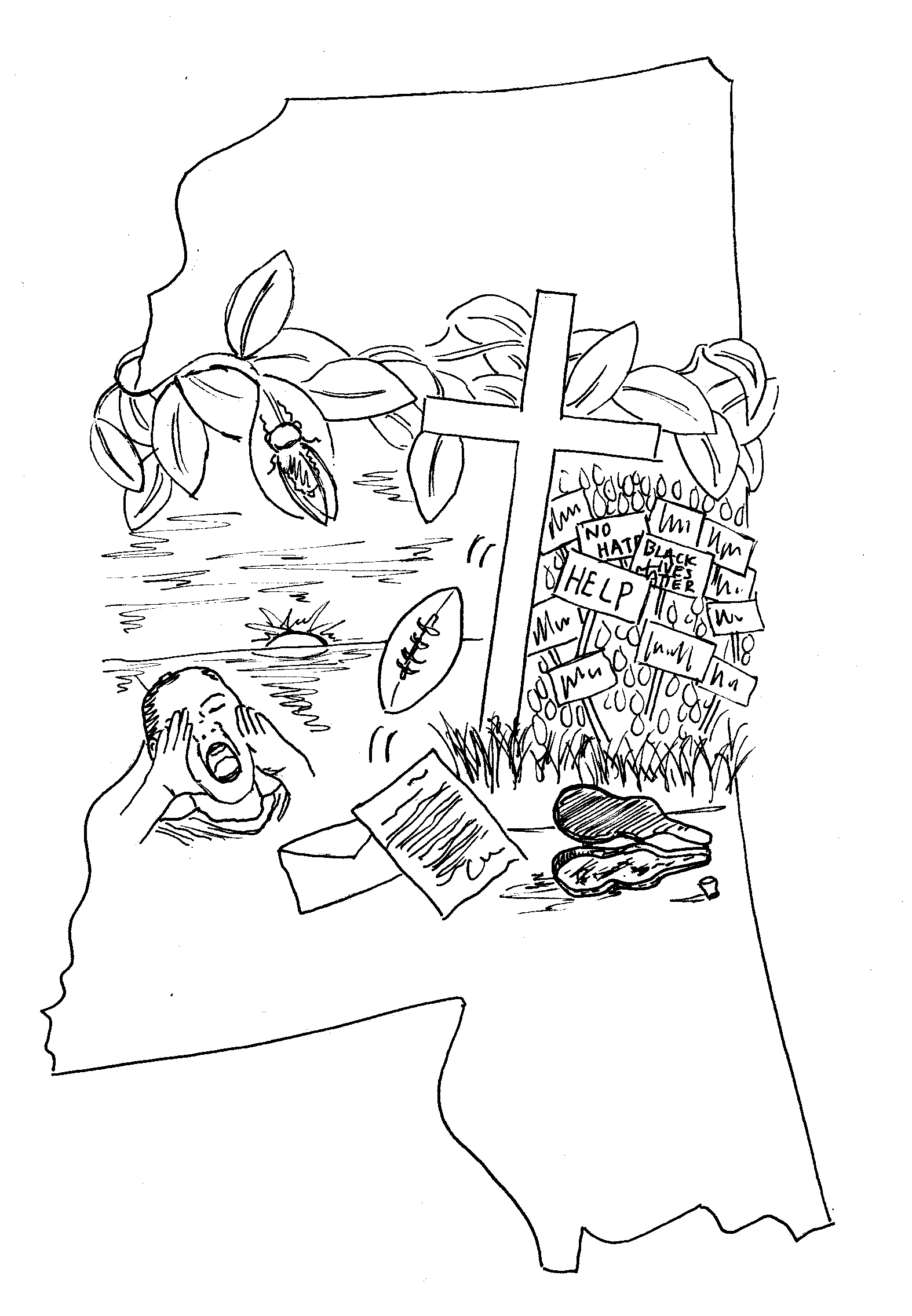Understanding home and its stories untold
September 21, 2018
This place holds secrets. I remember going outside in the early morning fog to be greeted with deafening silence from the cicadas who had stayed up all night buzzing. I remember staring out the car window for hours at sizzling gravel roads, wondering what horrors the rocks had seen. I remember lying in tickling grass and staring at the leafy canopy above, the world around me feeling all at once empty and incomprehensibly whole.
Not many people aim to visit Mississippi, let alone grow up there. It’s a place where America’s most pressing problems are magnified. So, naturally, I had my fair share of moments where I craved to cut ties with my home. As a kid, I resented my state and its ugly legacy. I learned early on that to live in this place means to think about race constantly—from the schools that are just as segregated as they were five decades ago, to my white classmates telling me they were afraid of getting shot in my neighborhood simply because it’s one of the few that is integrated, there is no ignoring that race affects experience. Growing up here gave me an understanding of difference and how to bridge it in a way that no other place truly could. The dull jolt that white people feel when learning about inequality and difference is absolutely laughable in comparison to what black people from Mississippi—and elsewhere—have dealt with since before the state’s inception, and that’s something one comes to feel in their bones. I am grievously tied to this past and am constantly learning how to face that head-on.
However, all who have lived there come to understand that beneath its bitterness, Mississippi hides an incredible, enigmatic beauty. It’s so easy to overlook, for at first glance the state is nothing more than an embarrassing blip in America’s past and present. Poverty is everywhere, as is racism, bigotry, corruption, fire-and-brimstone rhetoric and blood-thirsty bugs.
But I think somehow those nasty realities shape what it means to be a Mississippian; generations before me and generations after will strive to do more than just survive here. It’s so easy to focus on only that because Mississippi’s climate and political circumstances are and always have been unforgiving, certainly to some more than others. We are taught to cope with this by taking these threads of heartache and weaving them into stories both beautiful and ugly. They creatively and elegantly demonstrate what we have come to know. They are sometimes musical, sometimes artistic, sometimes eloquent and sometimes none of the above. They are my grandmother sitting in a room with me for hours going through the letters she wrote to her mom back in Sunflower County. They are the tales my best friend and I spun while driving late into the night. They are the sunsets I’d describe to anyone willing to listen. The musicians I heard on the streets, in churches and in concert halls constantly strumming their stories into melody. Some of my friends would even take heart-stopping pictures of our world that managed to tell stories about our existence.
Right before I left for college, I put together a photo album called “Things I Want to Remember about Mississippi.” At the time I had no clue how often I’d end up looking back at it, aching to understand what it was that I missed so much. It’s full of everything you’d expect and everything you wouldn’t: a 50-foot-tall cross, a sunset over the bayou, abandoned buildings, a mudslide, golden light brushing a white wall at dusk, an action-packed protest, young kids singing at the top of their lungs, fiery sunsets and a rowdy high school football game. But what’s also there is a record of lives intertwining, of bittersweet and lovely moments. It’s a testimony to a place that weighs you down in a way that teaches you to love intentionally and without regret.
“I was not leaving the South to forget the South, but so that someday I might understand it.” In these words, Mississippian Richard Wright doesn’t claim that our home is perfect. He rather uses simple language to convey that growing up in the South carries an incredible complexity that takes a lifetime to comprehend. It’s a place of exquisite chaos that I don’t mean to romanticize but to critically embrace. More of its secrets are waiting to be confronted, and I am choosing to be unafraid.
Gillian Raley is a member of the Class of 2021.
Comments
Before submitting a comment, please review our comment policy. Some key points from the policy:
- No hate speech, profanity, disrespectful or threatening comments.
- No personal attacks on reporters.
- Comments must be under 200 words.
- You are strongly encouraged to use a real name or identifier ("Class of '92").
- Any comments made with an email address that does not belong to you will get removed.


Bravo, Gillian– you are a writer. This was a pleasure to read, and kudos to you for having the presence of mind to put an album together during before going away. No wonder Bowdoin chose you.